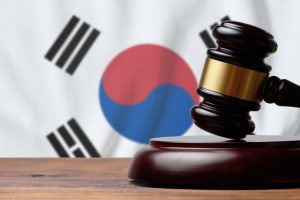A group of Korean farmers has filed a landmark lawsuit in South Korea seeking financial compensation for climate-related damage. The target is Korea Electric Power Corporation (KEPCO), the state-owned utility whose subsidiaries were responsible for approximately 27 percent of South Korea’s greenhouse gas (GHG) emissions between 2011 and 2022.
This is the first case in South Korea to seek financial compensation for climate-related harm from a corporation. By demanding civil liability and monetary redress for damages already suffered, the case turns the global push for climate accountability into a concrete legal claim, and sets a precedent for future compensation-based litigation in South Korea and beyond.
The KEPCO case’s legal approach marks a turning point for climate litigation in South Korea. While climate lawsuits have previously pushed governments to strengthen laws or recognize constitutional rights, this case breaks new ground by attaching quantifiable liability to a major emitter and pursuing direct redress for those harmed. In a new report, Solutions for Our Climate (SFOC) estimated that KEPCO’s emissions caused approximately $72.9 billion in cumulative climate-related damages between 2011 and 2023, based on a methodology adapted from a recent Nature study.
This is not just a domestic problem. South Korea is a major contributor to global carbon emissions and remains one of the largest public financiers of fossil fuel projects abroad. As the country’s largest emitter, KEPCO is a symbol of how governments continue to undermine their own climate pledges by shielding their fossil fuel giants from scrutiny.
Just weeks ago, the International Court of Justice (ICJ) confirmed what frontline communities have long argued: the right to a healthy environment is a human right. The court’s advisory opinion affirmed that states and by extension, the entities they empower have legal obligations to prevent environmental harm that threatens human life, dignity, and well-being.
Legal accountability is catching up. In August 2024, South Korea’s Constitutional Court ruled that the government’s weak climate law violated the rights of future generations. The historic ruling recognizes climate action as a constitutional duty. The lawsuit against KEPCO takes that logic one step further: if governments are bound by constitutional and international duties, then so are large influential corporations.
This case applies the legal logic of loss and damage litigation against “carbon majors” to a government-owned entity. Carbon majors refer to the 100 companies that are responsible for over two-thirds of GHG emissions globally, including oil and gas producers like ExxonMobil and Shell. While KEPCO is not a “carbon major,” its subsidiaries make it South Korea’s largest source of emissions. At the lawsuit’s core is a demand for civil financial liability: that KEPCO compensate farmers for measurable climate harm, including reduced crop yields, increased costs, and health risks. This lawsuit brings the carbon major model home and attaches a price tag to the climate damage it caused.
Similarly, the KEPCO case joins a growing wave of climate litigation seeking civil liability from corporate emitters. It closely echoes Lliuya v. RWE, in which a Peruvian farmer sued RWE, a German utility giant, for contributing to glacier melt that threatens his community. Like the KEPCO case, it argues that major emitters should be held civilly liable for the climate damage their emissions foreseeably cause.
These cases challenge the outdated assumption that climate harm is indirect for legal accountability. Science allows us to trace corporate emissions over decades, quantify their climate impacts, and demonstrate how they contribute to harm in specific places and communities.
For plaintiffs of the KEPCO case, climate change is not an abstract policy debate. They face real and immediate harms such as crop failures due to pests and heat stress, as well as increased expenses for fertilizers and heat-resistant equipment. Others face ongoing uncertainty about whether they can continue farming at all. These are not just economic losses; they are deeply personal injuries, including what courts and scholars increasingly recognize as climate anxiety.
When the ICJ declared that a healthy environment is a human right, it signaled to national courts that the law must evolve to meet the climate emergency. That evolution is already underway in South Korea. The Constitutional Court has recognized that inadequate climate action violates the rights of future generations. The next step is clear: ensure that government-backed emitters like KEPCO are not above the law.
South Korea now stands at an important juncture. Its institutions can either uphold this momentum or fall behind as the rest of the world advances legal protections for a livable planet. This lawsuit is not about blame. It is about justice, responsibility, and survival. It is a call for the law to reflect science, fairness, and the lived reality of those on the frontlines of the crisis.

































